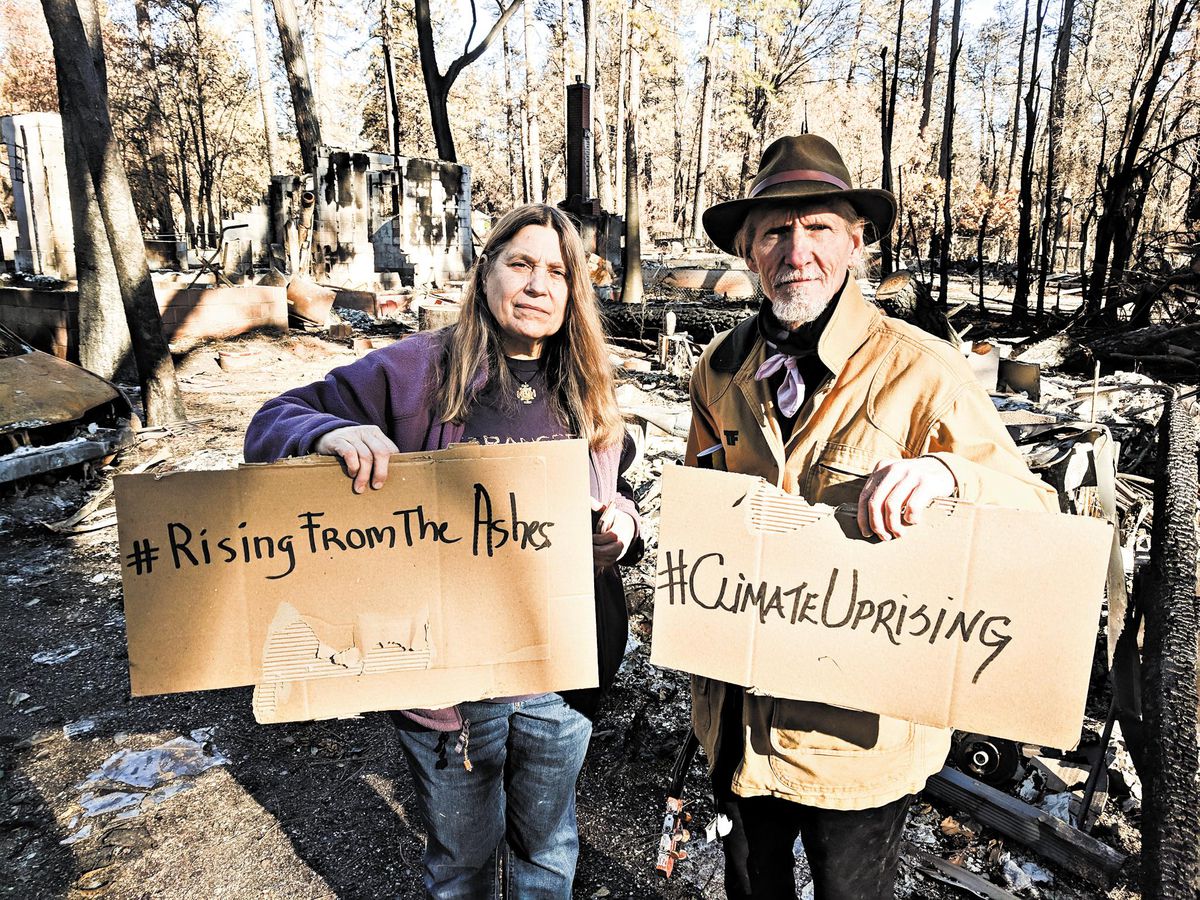
Photo courtesy of ClimateUprising.org
Susan Dobra and her partner, John-Michael Sun, spread the message of #ClimateUprising from the remains of their home in Paradise.
Two days from 2018 remain etched indelibly in Susan Dobra’s memory.
Nov. 8, she and her partner, John-Michael Sun, came dangerously close to the Camp Fire. Fleeing their home in Paradise, on the western edge of Bille Road, they escaped gridlock by parking at a nearby spiritual center, only to be told to head to the Skyway. They ditched their car, took their dog and hiked through forested neighborhoods—at one point saying goodbyes, fearing separation. Ultimately, a sheriff’s deputy drove them to Chico, swerving rapidly to avoid bursts of flame.
“It was like a movie set in a disaster film,” Dobra said.
Dec. 4, she spoke her piece to Bernie Sanders and Nancy Pelosi.
Dobra is a local leader for #ClimateUprising, a grassroots organization established after the fire to spur action on climate change: legislative, corporate and personal. L.A.-based filmmaker Nirvan Mullick arranged for Camp Fire survivors to attend a Washington, D.C., town hall called by Sanders, the senator from Vermont who hadn’t yet declared he’d again run for president. By the time they arrived at the nation’s capital, the itinerary ballooned to two full days of meetings with legislators, including Pelosi, the California Democrat who’d soon reclaim the post of speaker of the House.
The group featured Dobra and three nurses from Adventist Health Feather River, along with Audrey Denney, the Chicoan planning to challenge Rep. Doug LaMalfa for the second straight election (see “Round two,” Newslines, Feb. 28). In their meeting with Pelosi, Dobra sat beside the congresswoman.
“I looked her right in the eye and said, ‘You need to understand what just happened to us,’” Dobra recalled. After describing how she lost everything, as did all of her neighbors, who spread “to different parts of the region so we can’t even get together and commiserate with each other,” she told Pelosi: “I just need you to understand that so you understand what the actual price of global climate change is.”
Dobra wasn’t sure how much of an impression she made until just before exiting, when the congresswoman returned to her after speaking with others. Pelosi told her, “I do get what you’re talking about,” and relayed a personal story of fire loss.
“She said, ‘I don’t talk about this to anybody, but 30 years ago, my brother’s house burned to the ground, and it’s just like you say, they didn’t have a scrap of paper to write on—and they lost two children,’” Dobra shared. “‘So,’ she said, ‘I do understand.’
“That was powerful.”
Dobra’s account resonated with Sanders, too. The senator gave what she called “a very clear directive”: He encouraged her and the other survivors to keep telling their stories, keep advocating.
“I know for me, when I heard of people losing their houses in Redding [in the 2018 Carr Fire] and in Sonoma [in the 2017 Tubbs Fire], I didn’t really get it, didn’t really get it,” Dobra told the CN&R. “Even with people in my own town in 2008, whose houses burned to the ground [in the Humboldt Fire], I didn’t really understand it.”
Now Dobra carries that message, along with a call to action. She, like Mullick, cites research encapsulated in the federal government’s National Climate Assessment that climate change is exacerbating California’s wildfires. On social media, she’s appeared in #ClimateUprising photos and videos—as has her musician partner, Sun, most notably a performance of “Refugee” off his record The Ashes of Paradise (see Arts Devo, Feb. 21).
Word of what they were doing “pretty quickly reached a lot of folks,” Mullick said. His connection to the region was a Facebook friend. His connection to the Camp Fire, beyond empathy, was the experience of his sister evacuating from the Woolsey Fire concurrently ravaging Southern California.
According to the Intergovernmental Panel on Climate Change, without steps taken, he said, “in 30 years, 140 million to 200 million people will be displaced. The number could be as high as a billion.
“We’re seeing how complicated it is to deal with 52,000 people being displaced: housing shortages, downstream impacts, all this secondary homelessness, all these communities being spread out, lives forever destroyed, if not lost. It’s hard to imagine.”
Mullick has released clips from footage he and his #ClimateUprising crew have shot, such as the D.C. trip and the first time Dobra and Sun saw the remains of their home. They drew 300 people to Paradise for a Feb. 17 shoot. Mullick’s team is putting together other videos—and he plans to make a documentary on Camp Fire recovery and Denney leading up to the 2020 election.
Meanwhile, the organization has started planning a series of local town halls. Sanders told the D.C. group he’d come; now that he’s in campaign mode, his schedule has grown busier, but #ClimateUprising holds out hope. The first event will tie in with Earth Day, April 22; they’re firming a date and place to host national organizers of the Sunrise Movement, youth backers of the Green New Deal.
“We want to keep talking and telling stories,” Mullick said.
Just like Sanders encouraged them to do.
“We need to make people understand that this is what happens because of climate change,” Dobra said, paraphrasing the senator. “This isn’t a future problem; this isn’t [that] the seas are rising or the polar ice caps are melting—all of that is far away. This is hitting your hometown, and it’s going to happen over and over and over again if we don’t do something.”
